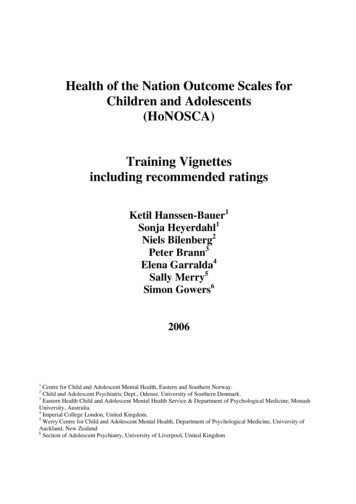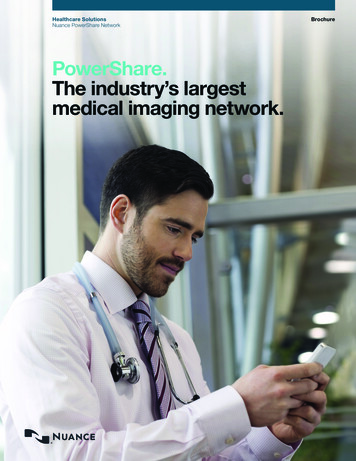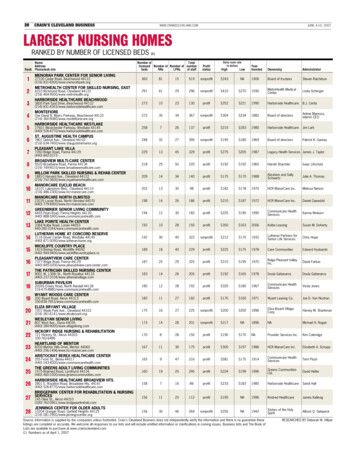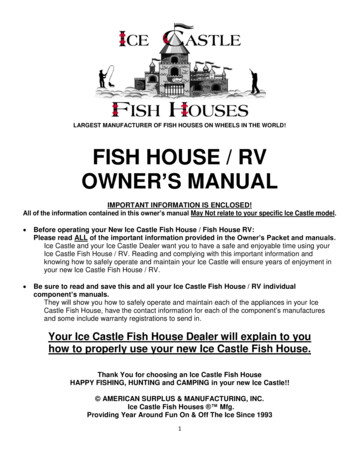
Transcription
The Nation’s Largest Health Care ProfessionImages from Nursing programs at Rutgers, Penn and Johns Hopkins
Federal figures project that if current trends continue, the shortage of RNswill continue to grow throughout the next 20 years. By 2020, more than800,000 RN positions are expected to go unfilled nationwide, according tothe National Center for Workforce Analysis, an agency of the U.S.Department of Health and Human Services. But already, in an expandingnumber of markets, hospitals and other employers are struggling to meetthe rising demand for RN care and have stepped up recruitment.Today's intensified hiring of RNs is being spurred by: the mounting health care needs of increasing numbers of elderly; a growing population of hospitalized patients who are older, moreacutely ill, and in need of more skilled RNs per patient; the rapid expansion of front-line primary care to many sites throughoutthe community; technological advances requiring more highly skilled nursing care; and an aging RN workforce. The average age of working RNs in 2008 was47.0 up from 40 in cts
Responsibilities: Perform physical exams and health histories Provide health promotion, counseling and education Administer medications, wound care, and numerous other personalizedinterventions Interpret patient information and make critical decisions about neededactions Coordinate care, in collaboration with a wide array of healthcareprofessionals Direct and supervise care delivered by other healthcare personnel likeLPNs and nurse aides Conduct research in support of improved practice and patient outcomesSettings: RNs practice in all healthcare settings: hospitals, nursing homes, medicaloffices, ambulatory care centers, community health centers, schools, andretail clinics. They also provide health care in more surprising locationssuch as camps, homeless shelters, prisons, sporting events and touristdestinations.NursingWorld.org
A master's degree in nursing is the educational core thatallows advanced practice nurses to work as nursepractitioners, certified nurse midwives, certified clinicalnurse specialists, and certified nurse anesthetists. According to theBureau of LaborStatistics, the medianpay for a masterslevel nurse in 2012was 96,460 annuallyNurse practitioners conduct physical exams, diagnose and treatcommon acute illnesses and injuries, administer immunizations,manage chronic problems such as high blood pressure and diabetes,and order lab services and x rays.Nurse midwives provide prenatal and gynecological care, deliverbabies in hospitals and private settings such as homes, and follow up with postpartum care.Clinical nurse specialists provide a range of care in specialty areas, e.g. oncology,pediatrics, cardiac, neonatal, obstetric/gynecological, neurological, and psychiatric nursing.Nurse anesthetists administer anesthesia for all types of surgery in operating rooms, dentaloffices, and outpatient surgical centers.Master's degrees in nursing administration or nursing education are also available.Some schools offer accelerated master's degree programs for nurses with nonnursing degrees and for non-nursing college graduates. There are also jointdegree programs, combining Nursing with a Master of Business Administration,Master of Public Health, Master of Hospital Administration or Master of Divinity,among others.For more information about accelerated programs to pursue a career in nursing,read the recent article from the American Association of Colleges of Accelerated-Programs
The admission requirements for master's programs in nursing vary a greatdeal and may include: a bachelor's degree and college transcripts coursework including anatomy and physiology, microbiology,psychology, statistics Graduate Record Examination (GRE) general test scores letters of reference an essayIt is important to remember that admission officers look at a student'stranscripts, clinical work, and letters of reference together holistically.Use the programs list provided by the AACN to research specificprograms: s
Johns Hopkins BS to MSNnursing.jhu.edu/academics/programs/bachelors/bs msn/ Yale graduate nursing programs for non-nursesnursing.yale.edu/ Penn BSN Second Degree and BSN/MSN ages/default.aspx MGH Institute (Boston) Accelerated BSN and MSNmghihp.edu/academics/nursing/degree-options/ University of California San rogram-nursing-mepn
American Association of Colleges of Nursing:AACN.NCHE.eduCentralized Application Service for nursing schools:NursingCAS.orgThe Honor Society of Nursing:NursingSociety.orgThe American Nurses rg
Some schools offer accelerated master's degree programs for nurses with non-nursing degrees and for non-nursing college graduates. There are also joint degree programs, combining Nursing with a Master of Business Administration, . MGH In











